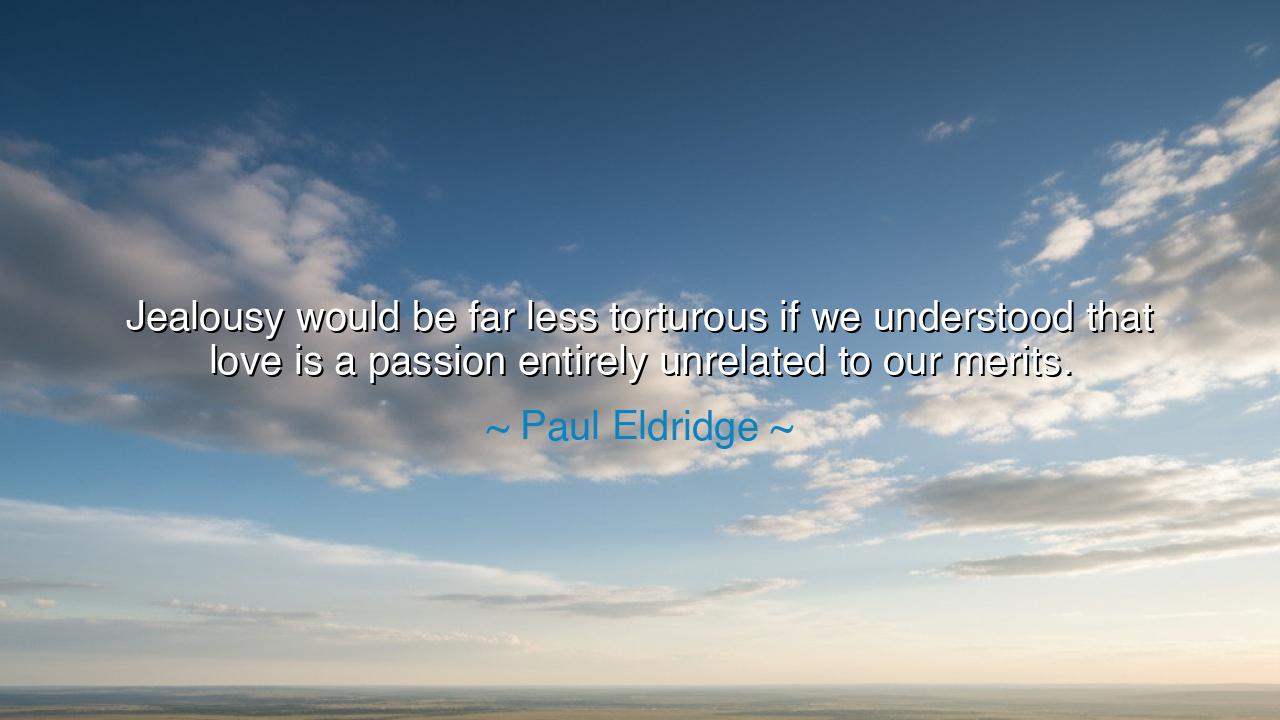
Jealousy would be far less torturous if we understood that love
Jealousy would be far less torturous if we understood that love is a passion entirely unrelated to our merits.






In the profound words of Paul Eldridge, the philosopher and poet of the human heart, there resounds a truth as delicate as it is piercing: “Jealousy would be far less torturous if we understood that love is a passion entirely unrelated to our merits.” Within this single line lies the anatomy of one of humanity’s oldest torments — jealousy, that consuming fire born not from love itself, but from the illusion that love must be earned or deserved. Eldridge, who spent his life exploring the complexities of emotion and intellect, reveals here a truth the ancients knew well: that love is not a reward for virtue, but a force that moves beyond reason, beyond justice, beyond the grasp of control.
To understand the origin of this thought, we must look into the soul of its author. Paul Eldridge, writing in the first half of the twentieth century, was both a romantic and a skeptic, a man who viewed the passions of humanity with both awe and sorrow. His insight was not drawn from abstraction but from observation — of how people suffer when they believe that love is a transaction, a reflection of their worth. In this single sentence, he exposes the folly that drives so much heartache: the belief that if we were only more beautiful, more noble, more deserving, we would be loved more deeply. But love, Eldridge reminds us, obeys no such logic. It arrives as it wills, blesses whom it chooses, and departs without reason. It is the wild wind of the soul, not the coin of morality.
Jealousy, then, becomes torture because it clings to false justice. The jealous heart cries, “Why them, and not me? Why do they possess the affection that should be mine?” It assumes that love, like virtue, is distributed according to merit. But Eldridge tells us that love is not earned, and therefore cannot be stolen. It is not given to the good and withheld from the unworthy; it flows as a river flows — sometimes nourishing deserts, sometimes passing by gardens. The one who understands this truth frees themselves from the endless anguish of comparison. For to be jealous is to believe in a fairness that never existed, while to understand love’s mystery is to accept the chaos and grace of the human heart.
The ancients, too, grappled with this paradox. In the myths of Greece, Aphrodite, goddess of love, bestowed her favors not upon the most righteous, but upon those who stirred her passion — often the flawed, the daring, the doomed. The tale of Paris and Helen stands as eternal witness. Was Paris the noblest of men? No — he was vain, impulsive, and reckless. Yet Aphrodite’s promise gave him Helen’s love, and in that love began the great tragedy of Troy. The Greeks understood what Eldridge would later put into words: that love’s fire burns not in the hearth of justice, but in the wilderness of fate. To demand that love be “fair” is to demand that fire obey the shape of the hand that holds it.
And yet, Eldridge’s wisdom does not condemn love — it liberates it. For if love is unrelated to merit, then it is also free from judgment. It is not the currency of perfection but the language of souls. To be loved is not to be rewarded for who we are, but to be seen — not for our worth, but for our being. And to love another, truly and without demand, is to honor this mystery: to love not because they are perfect, but because they are alive, because their presence moves the heart. When we see love this way, jealousy loses its teeth, for there is no longer anything to compare, no debt to measure, no rival to defeat.
Consider the story of Vincent van Gogh, the painter whose life was a storm of longing and rejection. He loved deeply — his art, his friends, the world itself — and yet he was rarely loved in return. In letters to his brother Theo, he spoke often of despair, of feeling unworthy, of yearning to be cherished as others were. But even in loneliness, his heart did not harden. He poured his love into color, into light, into creation itself. Van Gogh came to understand what Eldridge speaks of: that love is not a reward, but a gift — and that even when it is not returned, it remains sacred. His genius, born of pain, transformed jealousy into compassion, and longing into beauty.
The lesson, then, is both humbling and freeing: release the belief that love must be deserved. Accept that the heart chooses as it will, that affection is not a prize but a miracle. When love comes to you, receive it with gratitude, not pride; when it departs, let it go without resentment. Do not measure your worth by who loves you, nor envy those who are loved by others. Instead, become love itself — give it freely, without calculation or demand. For in giving, you escape the chains of jealousy; in loving, you discover your own abundance.
So, my listener, remember Paul Eldridge’s immortal wisdom: jealousy fades when we understand that love owes us nothing. It is not earned by virtue nor destroyed by fault; it exists because the heart, in its wildness, seeks connection beyond all reason. To love without expectation is to live without torment. Let your heart, then, be free — not as a beggar waiting for affection, but as a flame that burns for the joy of burning. For in this freedom lies the highest form of wisdom: to know that love, like life itself, is beautiful precisely because it cannot be controlled.






AAdministratorAdministrator
Welcome, honored guests. Please leave a comment, we will respond soon